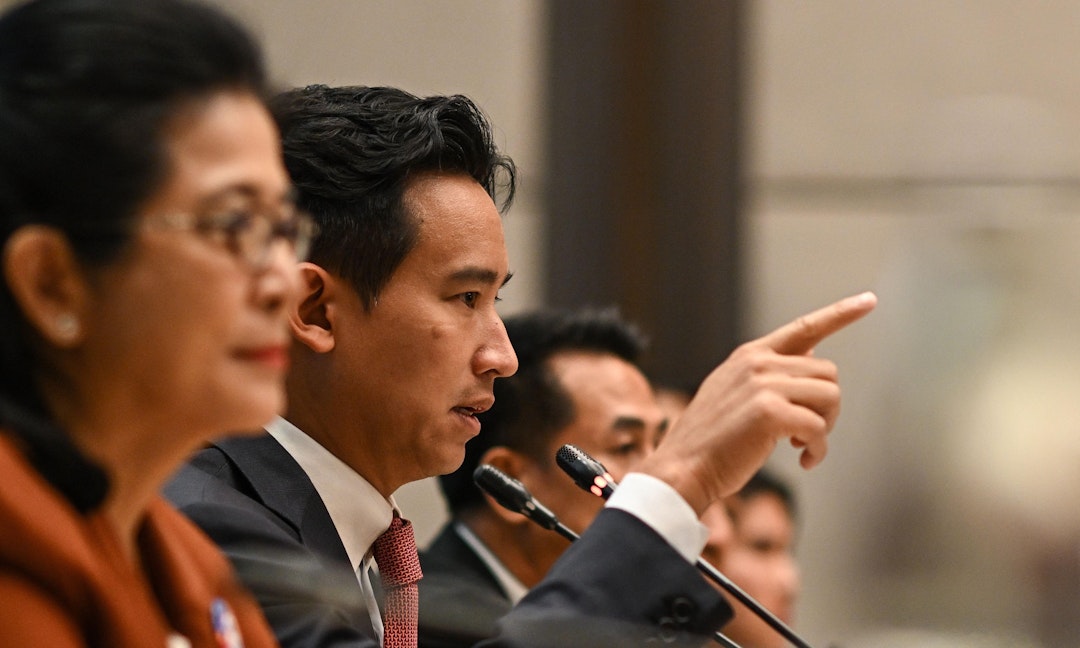
Opposition parties in Thailand met for coalition talks in Bangkok on Wednesday, as they seek to convert their shock success in elections at the weekend into a working government.
The liberal Move Forward Party, which won the largest share of the vote, was leading the talks and looking to form the government.
It invited five other parties to the closed-door negotiations.
However, whether the parties can form a government that will then be approved by Thailand’s bicameral legislature — with the upper house appointed by the defeated military-linked government and notoriously conservative in its voting habits — is by no means guaranteed.
They may even struggle for consensus amongst each other on some issues, for instance, the country’s strict lese majeste laws against any criticism of the royal family.
Who was taking part?
The leader of the Move Forward Party, Pita Limjaroenrat, invited five other blocs to the discussions.
The largest is the Pheu Thai party, actually the dominant force of Thailand’s politics for years, but which had been unable to form a government despite faring better than the military-allied leadership in the last five general elections. It secured 141 seats, according to the latest projections, just 10 shy of Move Forward’s total.
Pita also approached the Thai Sang Thai, Prachachart, Seri Ruam Thai, and Fair parties.
Although they posed for various photos prior to the talks, they negotiated in private.
Third-strongest party plants flag on lese majeste issue
Meanwhile, late on Wednesday, the third-strongest party in the vote, Bhumjaithai Party, said that it would not support any prime minister planning changes to the country’s law against insulting members of the royal family, which can even carry lengthy jail terms.
This could be a major blow for the moderate Pita and his Move Forward movement, which had said it wanted to make only slight alterations to the law, to avoid the risk of the powers being misused, as the party put it.
Pheu Thai, meanwhile, has played its cards on this issue rather closer to its chest, and Bhumjaithai’s statement prompted speculation on whether they might emerge as effective kingmakers and bolster Pheu Thai’s leader Chonlanan Srikaew.
However, Pheu Thai itself had urged holdout parties to join Wednesday’s talks, presumably scenting the chance to govern the country again in some capacity after years of winning elections only to cede power.
Thailand is very reverent of its royal family, despite them having lived abroad for the most part for decades and barely taking part in public life. The current king, Maha Vajiralngkorn, spends much of his time at his second home in Bavaria.
German authorities at one point objected to this as a possible breach of diplomatic protocols, but let their concerns drop on receiving assurances that he was not conducting any official business as head of state from his lakeside villa in the Bavarian Alps during his often lengthy stays there.
Some German opposition politicians expressed doubts that this assurance could be accurate at the time, not least as Vajiralongkorn is reported to have taken a more active interest in politics than his long-serving father, King Bhumibol Audlyadej, who died in 2016.
Military-allied appointed senate another major hurdle for possible government
Even if the various opposition parties can reach an agreement among themselves, it might not guarantee them the opportunity to install a prime minister and government.
Under Thailand’s military-drafted constitution, a majority bicameral vote must approve any new prime minister. That will mean that any future prime minister would either need support from the military-allied parties in the lower house, or from a fair chunk of the military-appointed representatives in the Senate who have a record of supporting former general and then Prime Minister Prayuth Chan-ocha.
By contrast, a prime minister candidate loyal to the military could probably clear this particular voting hurdle with ease — but given the results, they would risk major public unrest, and also face the prospect of being unable to govern from the lower house of parliament once in power, owing to a lack of support.
Some Thais could be observed criticizing this situation on Wednesday, with questions like “why do we need a senate?” popular on social media websites like Twitter.
Analysts expect weeks to months of talks and deal-making as parties jostle to form a government.
msh/jcg (AFP, AP, Reuters)
This article was originally published on Deutsche Welle. Read the original article here.
READ NEXT: Does Thailand’s Election Matter?
TNL Editor: Bryan Chou (@thenewslensintl)
If you enjoyed this article and want to receive more story updates in your news feed, please be sure to follow our Facebook.







